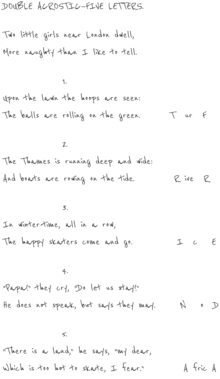
Acrostic
An acrostic is a poem or other form of writing in which the first letter, syllable or word of each line, paragraph or other recurring feature in the text spells out a word or a message. The word comes from the French acrostiche from post-classical Latin acrostichis, from Koine Greek ἀκροστιχίς, from Ancient Greek ἄκρος "highest, topmost" and στίχος "verse"). As a form of constrained writing, an acrostic can be used as a mnemonic device to aid memory retrieval.
Overview
Relatively simple acrostics may merely spell out the letters of the alphabet in order; such an acrostic may be called an 'alphabetical acrostic' or Abecedarius. These acrostics occur in the first four of the five songs that make up the Book of Lamentations, in the praise of the good wife in Proverbs 31, 10-31, and in Psalms 9, 10, 25, 34, 37, 111, 112, 119 and 145 of the Hebrew Bible.
Notable among the acrostic Psalms are the long Psalm 119, which typically is printed in subsections named after the letters of the Hebrew alphabet, each of which is featured in that section; and Psalm 145, which is recited three times a day in the Jewish services. Acrostics prove that the texts in question were originally composed in writing, rather than having existed in oral tradition before being put into writing.